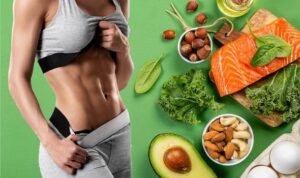In our modern society, weight gain has become a pervasive issue affecting individuals of all ages and backgrounds. The fast-paced lifestyle, sedentary habits, and easy access to processed foods have contributed to an alarming rise in obesity rates worldwide. As a result, weight loss has become a prevalent topic of concern and interest for many seeking to improve their health and overall well-being. Following 7 must read Books can help in Effective Weight loss
1. The Obesity Code
“The Obesity Code” by Jason Fung is a book that challenges conventional wisdom about weight loss and provides a fresh perspective on the underlying causes of obesity. Dr. Fung, a renowned nephrologist and expert in intermittent fasting, explores the role of insulin in weight gain and offers practical advice on how to achieve sustainable weight loss. He provides detailed explanations of how fasting impacts the body’s metabolism and insulin sensitivity. Throughout the book, Dr. Fung debunks common myths about weight loss and offers practical recommendations, including meal planning, healthy eating guidelines, and tips for overcoming cravings and emotional eating. “The Obesity Code” also delves into the detrimental effects of processed foods, refined carbohydrates, and sugar on insulin and weight gain. Dr. Fung emphasizes the importance of adopting a whole-food, low-sugar diet to achieve and maintain a healthy weight. Overall, “The Obesity Code” presents a comprehensive understanding of the factors contributing to obesity and offers evidence-based strategies to help individuals achieve long-term weight loss and improved health.
2. Mindless Eating
“Mindless Eating” by Brian Wansink explores the psychology behind our eating habits and sheds light on the unconscious factors that influence our food choices and portion sizes. The book reveals how our environment, social cues, and personal habits can lead to mindless eating and weight gain. Wansink presents a range of fascinating experiments and studies that demonstrate how subtle environmental cues can influence our eating behaviors. He reveals how factors like plate size, packaging, food placement, and even the names given to dishes can significantly impact our consumption. The book emphasizes the concept of the “100-calorie mindless margin,” which suggests that small changes in our eating habits can have a profound impact on weight management. Wansink offers practical strategies to help readers become more mindful of their eating, such as using smaller plates, keeping unhealthy snacks out of sight, and creating a healthier food environment. Furthermore, “Mindless Eating” delves into the concept of food triggers and explores ways to overcome emotional eating and food cravings. Wansink offers insights on how to restructure our eating environment and develop healthier eating habits through conscious decision-making. “Mindless Eating” offers valuable insights into the subconscious factors that influence our eating habits and provides actionable strategies for cultivating mindful eating behaviors. By increasing awareness of the hidden influences on our food choices, the book empowers individuals to make healthier decisions, regulate portion sizes, and attain long-term weight management success.
3. In Defense of Food
“In Defense of Food” by Michael Pollan is a thought-provoking book that challenges the modern food industry and its impact on our health. Pollan investigates the fundamental question of what we should eat to maintain a healthy lifestyle and addresses the confusion and misinformation surrounding nutrition. The book highlights the shift in food culture from whole, unprocessed foods to a diet dominated by processed and industrialized products. Pollan explores the detrimental effects of the Western diet, characterized by excessive consumption of refined carbohydrates, added sugars, and unhealthy fats. Pollan presents a simple and memorable mantra: “Eat food. Not too much. Mostly plants.” He encourages readers to return to a more natural and traditional way of eating, focusing on real, whole foods rather than processed alternatives. He emphasizes the importance of consuming a variety of fruits, vegetables, whole grains, and lean proteins. The book also delves into the concept of “nutritionism,” which reduces the value of food to its nutrient content rather than considering the food as a whole. Pollan argues that this reductionist approach has led to the proliferation of processed foods and misleading health claims.
Overall, “In Defense of Food” advocates for a return to a simpler and more mindful approach to eating, focusing on real, whole foods and rejecting the processed and industrialized products that dominate the modern diet. By promoting a healthier and more balanced way of eating, the book aims to improve individual and societal well-being.
4. The 4-Hour Body
“The 4-Hour Body” by Timothy Ferriss is a comprehensive guide that explores various methods, experiments, and strategies for optimizing health, fitness, and body composition. The book takes a unique and often unconventional approach to achieving physical transformations. Ferriss explores concepts like the Minimum Effective Dose (MED), which involves identifying the smallest possible action that generates the desired outcome. The book covers various diet approaches, including slow-carb and ketogenic diets, and includes tips for optimizing nutrient intake and controlling cravings. Ferriss also delves into exercise techniques, such as high-intensity interval training (HIIT) and targeted muscle training, with an emphasis on efficiency and maximum results. In addition to physical transformations, Ferriss discusses other areas of health, such as sleep quality and sexual performance. He explores methods for improving sleep duration and quality, as well as techniques for enhancing sexual experiences.
Overall, “The 4-Hour Body” offers a wide array of unconventional strategies and techniques for optimizing physical performance, body composition, and overall well-being. It encourages readers to question conventional wisdom and experiment with alternative approaches to achieve their desired outcomes. The book encourages readers to experiment and find what works best for their individual goals and circumstances.
5. Eat, Drink, and Be Healthy
“Eat, Drink, and Be Healthy” by Walter C. Willett is a comprehensive guide to understanding the science of nutrition and making informed choices for optimal health. The book provides evidence-based recommendations for a balanced and sustainable approach to eating. Willett, a renowned nutrition expert, delves into the fundamental principles of nutrition and the impact of diet on overall health and well-being. The book addresses common misconceptions about macro nutrients, including carbohydrates, proteins, and fats, providing insights into their roles in the body and how to make healthier choices within each category. Willett also explores the benefits of specific food groups such as fruits, vegetables, whole grains, and legumes. In “Eat, Drink, and Be Healthy,” Willett highlights the importance of mindful eating, portion control, and enjoying meals in a relaxed environment. He offers practical tips for incorporating healthier habits into daily life, such as meal planning, smart snacking, and finding balance in eating out. Willett also discusses the connection between diet and chronic diseases, such as heart disease, diabetes, and certain types of cancer. He provides evidence-backed strategies for reducing the risk of these conditions through dietary choices and lifestyle modifications. Furthermore, the book explores the impact of beverages, including water, coffee, tea, and alcohol, on overall health. Willett provides guidelines for responsible and moderate consumption, emphasizing the importance of hydration and being mindful of added sugars in beverages.
Overall, “Eat, Drink, and Be Healthy” is a valuable resource for individuals seeking to make informed decisions about their diet and lifestyle. Willett’s evidence-based approach, combined with practical recommendations, empowers readers to take control of their health by adopting a balanced and sustainable approach to eating and drinking.
6. The DASH Diet Weight Loss Solution
“The DASH Diet Weight Loss Solution” by Marla Heller is a comprehensive guide that combines the principles of the DASH (Dietary Approaches to Stop Hypertension) diet with effective weight loss strategies. The book provides practical advice, meal plans, and recipes to help readers achieve their weight loss goals while promoting overall health. The DASH diet is known for its focus on reducing sodium intake and increasing the consumption of nutrient-rich foods like fruits, vegetables, whole grains, lean proteins, and low-fat dairy products. It has been scientifically proven to lower blood pressure and improve heart health. In this book, Heller introduces a tailored version of the DASH diet specifically designed for weight loss. She explains the core principles of the diet, including portion control, balancing macro-nutrients, and making mindful food choices. The book emphasizes the importance of reducing calorie intake while still providing a wide range of delicious and satisfying meal options. “The DASH Diet Weight Loss Solution” offers practical tips for meal planning, grocery shopping, and dining out, making it easier for readers to incorporate the DASH diet into their daily lives. The book also includes a variety of recipes, from breakfast options to main dishes and snacks, to support weight loss and help readers maintain a nutritious and satisfying eating plan.
It’s important to note that while the DASH diet and weight loss strategies outlined in the book can be beneficial for many individuals, consulting with a healthcare professional or registered dietitian is recommended to ensure that the approach is suitable for your specific needs and health goals.
7. The Body Reset Diet
“The Body Reset Diet” by Harley Pasternak is a 15-day program designed to jump start weight loss and reset the body’s metabolism. The book presents a structured plan that focuses on incorporating nutrient-dense smoothies, solid meals, and light exercise into daily routines. Pasternak introduces the concept of “body resetting” through the strategic combination of smoothies and whole foods. The program consists of three phases, each lasting five days. In the first phase, participants consume primarily smoothies made with a variety of fruits, vegetables, proteins, and healthy fats. These smoothies are designed to provide essential nutrients while keeping calorie intake controlled.In the second phase, solid meals are gradually introduced alongside smoothies. The meals prioritize whole foods, including lean proteins, vegetables, and complex carbohydrates. The aim is to maintain a balanced and nourishing diet while continuing to support weight loss.The final phase focuses on long-term weight maintenance. Participants learn strategies for portion control, meal planning, and making healthier food choices to sustain their progress beyond the 15-day program.
“The Body Reset Diet” also includes meal plans, recipes, and shopping lists to simplify the implementation of the program. Pasternak offers practical tips and insights to help readers develop healthy habits and maintain their weight loss results over time.While the program can be effective for jump starting weight loss and adopting healthier habits, it’s important to note that individual results may vary. It’s always advisable to consult with a healthcare professional or registered dietitian before starting any new diet or exercise program to ensure it aligns with your specific needs and health goals.
Disclaimer:
Books on fat loss or any other health-related topics, it is important to keep in mind that the
information provided is for educational purposes only. The content in these books should not be considered a substitute for professional medical advice, diagnosis, or treatment. Every individual’s health and fitness needs are unique, and what works for one person may not work for another. Before making any significant changes to your diet, exercise routine, or lifestyle, it is recommended to consult with a qualified healthcare professional or registered dietitian. They can provide personalized guidance based on your specific health condition, goals, and needs. Remember to listen to your body and prioritize your overall well-being when implementing any advice or strategies from fat loss books or other health resources.




